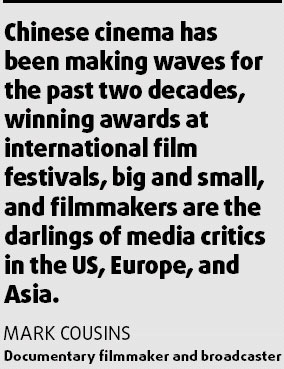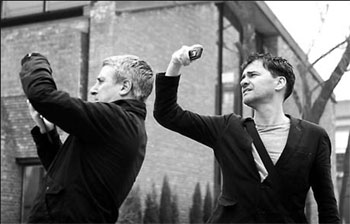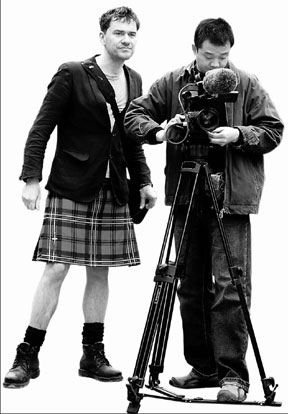A story unfolds
Wearing a Scottish kilt despite the early spring breeze, Mark Cousins walks briskly though Beijing's 798 Art District. Attracting curious looks, he wanders in the art district with his hands framing out the best angles before telling the cameraman to start filming.
|
Mark Cousins and Morgan Peetrie visit 789 Art District in Beijing. |
As he arrives at an open ground on the northern side of 798, where the Tribeca Film Festival in Beijing was held last July, he pauses. He asks the cameraman to film the wall where a huge screen was rolled down then for a free community outdoor screenings of the film Planet B-boy during the two-day independent film event.
"Perfecto!" he cheers as the camera rolls.
Documentary filmmaker and broadcaster, Cousins was the director of the Edinburgh Film Festival from 1996-97 where he established the Scene by Scene interview format with actors and directors that was later turned into a BBC2 series with Cousins as presenter and director.
He is filming in Beijing and Shanghai for The Story of Film, a six-hour documentary on the history of world cinema. Meanwhile, he is working with the Scottish government to hold a festival of Scottish film in China and to bring Scottish movie stars and directors here.
"Chinese cinema has been making waves for the past two decades, winning awards at international film festivals, big and small, and filmmakers such as Zhang Yimou, Chen Kaige, Ang Lee, and Wong Kar-wai are the darlings of media critics in the US, Europe, and Asia," he says. "Therefore the country's (film-making) is an important part of the documentary," he says taking the names of such celebrated films as Yellow Earth, Raise the Red Lantern, In the Mood for Love, Crouching Tiger, Hidden Dragon, and House of Flying Daggers which have won critical as well as popular acclaim.
The documentary is based on Cousins's book of the same title. The book, The Story of Film, is a chronological account compiled from the point of view of filmmakers and moviegoers.
Joining him on this project is Morgan Peetrie who works for the film body Scottish Screen, which is supporting the project, and John Archer, the managing director of Hopscotch Films, the producer of the documentary.

"We have been able to film the China section of Mark's book, The Story of Film which takes an international perspective on the history of cinema asking where and when in the world was cinema at its most innovative and inventive," Archer says.
Cousins uses a similar style in the documentary.
"So far we have filmed in Iran with many of their leading directors including Abbas Kiaromastami, and in Egypt with Youssef Chahine. We have also interviewed German director Wim Wenders and the Hong Kong director Tsai Ming-Liang," Archer says.
During their two weeks in Beijing and Shanghai, the team also interviewed Chinese directors and visited the Beijing Film Academy and the China Film Archive.
"The best thing has been meeting legendary directors such as Xie Jin and Tian Zhuangzhuang. And seeing a new documentary at the Shanghai film Art center," says the team. Xie is of the most renowned directors in contemporary China, who became famous after making Woman Basketball Player No 5, China's first color sports feature film. His most representative pieces include The Red Detachment of Women and Stage Sisters. Tian is best known for Horse Theft and Spring in A Small Town.
The team has also filmed the hutong at Houhai, the Great Wall and the Forbidden City in Beijing, which they think represents this city.
While filming behind the Forbidden City, they captured local people flying kites along the river. In a narrow alley near An'dingmen subway station, they were attracted by a family having lunch at their grocery store.
"The store was small but the family looked intimate and warm," Cousins says. "I love that scene particularly because that is how people live here," he says. "That is the culture which offers the basis for Chinese films."
"Beijing feels like a different world. Very different from home. Very special. Shanghai is much more Western - an extreme version of parts of London and New York. The modern parts look best at night with their neon lights. But best of all, we enjoyed walking through the low-rise old housing seeing ordinary life being lived," Archer says.
On their documentary project, Cousins says: "Chinese films are more about women than Western films."
|
Cousins works with Zou Fengyi from CCTV. Photos by Guo Yingguang |
For the planned film festival, he wants to assess what kind of Scottish films people want to see and where they can be screened. He mentions his favorite Chinese actress Ruan Lingyu and adds: "We have invited Maggie Cheung who played Ruan at the event, Cinema China, last year.
"It was the UK's largest ever Chinese film festival featuring more than 20 important films from the past 80 years of Chinese film-making.
"This film event inspired us to explore China and its film history," says Peetrie.
Weaving personalities, film technology, and production with engaging descriptions of groundbreaking scenes, Cousins uses his experience as film historian, producer, and director to capture the shifting trends of movie history.
"We learn how filmmakers influenced each other; how contemporary events influenced them; how they challenged established techniques and developed new technologies to enhance their medium," he says.
On choosing the documentary format, Archer says: "It will bring the book alive. We both love documentaries - they bring the world and all kinds of people to you. Mark wrote a history of the documentary film with Oscar winner Kevin MacDonald."
"We want to show people around the world how great Chinese film heritage is."
(China Daily 03/20/2008 page18)
















